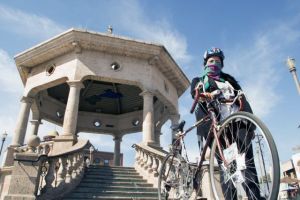By Brizette Castallanos, Boyle Heights Beat
For most people, riding a bike is a way to squeeze in some exercise, a favorite pastime or a form of transportation. But for Xela de la X, a single mother, riding is freedom.
The freedom De la X talks about isn’t the kind you feel when you’re out past your curfew, but rather the sense of empowerment you feel after working through a hardship.
A survivor of sexual abuse and domestic violence, De la X says she discovered a feeling of liberation while riding her bike home from work through jam-packed downtown Los Angeles.
“I had at that moment a brief taste of freedom. Just the ability to overcome things — it was like a metaphor for things we have to overcome as women of color daily,” says De la X, a Boyle Heights native.
The desire to share this sense of freedom with other women led her to found Ovarian Psyco-Cycles in 2010. The all-woman cycling brigade has gone on to become popular for its unapologetic approach to radical bike rides, such as Clitoral Mass, an event held as an alternative to male-dominated group rides, which drew more than 200 women last summer.
Tools for empowerment
Members of Ovarian Psyco-Cycles don’t ride for leisure, but for a cause, and see their bicycles as tools for empowerment. The group organizes bike rides to bring awareness to issues that affect women of color and working class backgrounds.
In the last four years, the group has grown in size and popularity. It has seven core members, mostly Eastside residents who range in age from 18 to 35. Every month, about 15 to 30 women show up for the Luna Rides, which de la X says take their name from the moon’s connection with a woman’s menstrual cycle and encourage solidarity among women.
The collective also hosts occasional event rides and workshops that are open to everyone. These are aimed at raising awareness of violence against women, such as the one organized shortly after the disappearance of Bree’Anna Guzmán, a 22-year-old Latina who was abducted in Los Angeles and found dead in Echo Park on January 25, 2012.
Many within the cycling community say that Ovarian Cycles is unlike any other cycling group in Los Angeles.
Carlos Morales, 53, a bike advocate for more than five years and founder of the Eastside Bike Club, has collaborated with the group several times.
“I don’t know of any other group that’s female operated,” says Morales. “They do the cycling–that’s one thing–and then for them to expand those horizons and get involved in the community and give back–it’s not happening [anywhere else].”

Evelyn Martinez, 22, has been an “ova” for over two years. Photo by Jonathan Olivares.
Many Ovas, as they call themselves, grew up in unhealthy home environments and have dealt with domestic violence, drug abuse or alcoholism. They view their personal struggles as fuel that powers their motivation.
Other groups “see cycling as a leisurely activity, and we don’t have that time or privilege,” says De la X. “Cycling can’t be a leisure, not right now, not in today’s world.”
Advocating for change
Being part of the collective has helped members gain self-confidence and led them to join in advocating for change in their community.
Evelyn Martínez, 22, who has been part of the Ovas for two years, says other women in the group have supported her in speaking out against gentrification in Boyle Heights.
Her experience, she says, “wasn’t just about riding a bike. It was also about engaging in conversations that no one that I knew was having.”
As a teenager in Boyle Heights, Martínez was active in the discussion happening around the displacement of residents in Wyvernwood, an apartment complex that may be knocked down and replaced by condominiums as part of a giant development project. But she strayed from activism when she felt she didn’t have enough support from her neighbors.
“With the Ovarians, I felt there is a space open to me to come and voice my opinions and share my concerns and share my vision for my community.”
Today, Martínez relies on her bike to get everywhere. Whether it’s school or a protest, her bike is her tool.
